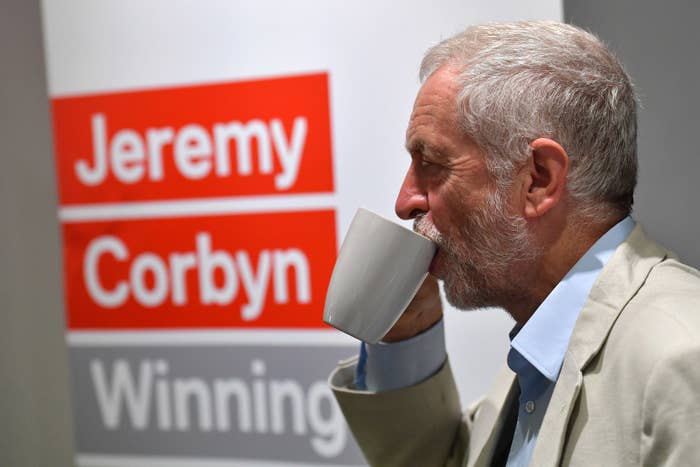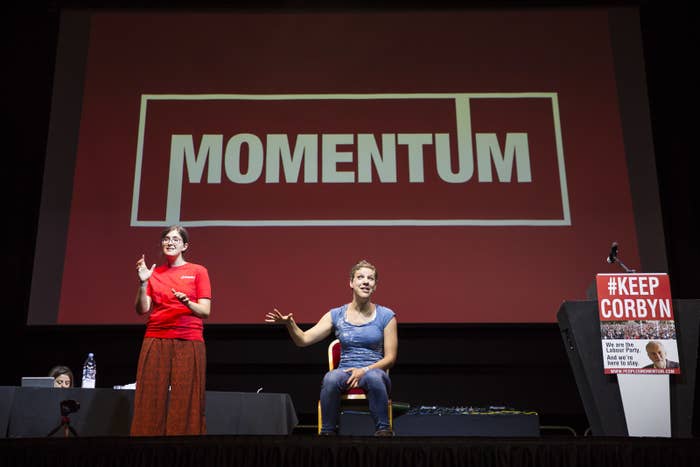
After a year of complaints from journalists about Jeremy Corbyn's media strategy being ineffectual and disorganised, reporters say the Labour leader's team are finally running a slick operation with the press. All it took was another leadership election.
The campaign last summer was criticised by journalists for lacking discipline and being hard to get in touch with – and after he won, the day-to-day media operation became even worse, with press releases reaching inboxes too late and press officers not responding to requests for comment quickly enough, if at all.
Over the past month, however, journalists told BuzzFeed News they have been pleasantly surprised to find that Corbyn’s leadership campaign has featured a competent press operation that was getting its message out.
"Since the campaign started, there has been a step up in the professionalism of the comms side of things compared to the day-to-day running [of the] leader's office," said one online political reporter who deals regularly with the team.
Another political correspondent agreed, saying "they've run a very sharp operation this time". This was noticed, for example, when deputy leader Tom Watson attacked the leadership in a Guardian interview and a response to the claims landed in journalists' inboxes less than two hours later.
One person on Corbyn's team says it's because they are finally at liberty to work away from “uncooperative” teams at Labour HQ, freeing them from the existing Labour structure, which is distrusted by Corbyn's office.
Whether or not Labour HQ was actually hindering their efforts, a consensus among journalists seems to be that the Corbyn campaign team is much more streamlined than last summer, when it was largely reliant on one overworked former Stop the War press officer.
This perception of chaos continued after Corbyn was elected leader with no substantial media team, which notoriously enabled reporters to listen in on sensitive conversations simply by standing outside doors. Guardian columnist Seumas Milne's appointment as the party's director of strategy and communications did little to salvage things, with several reporters saying he did little day-to-day media management.
Instead, most handling of the leader's media was done by the long-suffering Kevin Slocombe, a union official who agreed to take the job on a temporary basis for a few weeks when Corbyn was first elected leader and unexpectedly found himself handling it almost singlehandedly until he finally quit last month.
Labour rules prohibit staff who are paid by the party from taking part in leadership campaigns, meaning that many of the leader's usual staffers are blocked from taking part in the leadership campaign, thereby forcing Corbyn to build a bespoke team for the occasion.
The campaign team is led by James Mills, who until recently worked for shadow chancellor John McDonnell, and, among others, Sam Tarry, a Dagenham councillor on loan from the Corbyn-supporting TSSA union.
The pair were described by a political correspondent as “pretty good – and quick! – as opposed to the leader's operation, which is somewhat less than tip-top”.
The step up in efficiency has been much needed, not least because Corbyn's leadership rival, Owen Smith, has been able to pick and choose from an experienced pool of Labour press operatives to staff his campaign. The vast majority of professional Labour staffers are opposed to Corbyn.
Also at the top of Corbyn's new comms team is James Schneider. The figurehead of pro-Corbyn group Momentum, formed during last year's leadership campaign, is also helping run Corbyn's campaign this summer.
He has earned praise from the press, with at least one reporter for a national newspaper incredibly grateful for there being someone to return their phone calls. “I’ve always been surprised at how helpful and switched on James Schneider is," they said. "He totally gets it.”

“Momentum, who are effectively running the campaign, have always been better at dealing with the press than the leader's office,” another correspondent said.
A source working for Corbyn’s campaign, however, said the leader’s team in parliament shouldn’t have to shoulder all the blame for the reputation of a slow-running media operation, and pointed fingers at Labour HQ instead.
“There's too much bureaucracy in Labour, they slow things down; everything has to go through them," they said. "There's a reason stuff got out at 6 – it wasn't getting signed off.”
The source also accused Labour staff of delaying press releases on purpose, meaning they missed news deadlines, saying "there's always been tension between the leader's office and Labour HQ, and it's now stronger than it's ever been”.
They then suggested that while 80% of employees at Labour’s HQ and regional offices do their job well, there are 20% at the top who interfere politically with attempts to get Corbyn's message across. These are "the ones we want to get rid of" if Corbyn wins the leadership contest, the source said.
While ambitious, this may not be enough to solve Corbyn’s media woes in the long run: While his team is getting better, the man himself still has an uneasy relationship with the press and has a hard time jumping through the hoops required to get coverage.
"Both Corbyn and McDonnell are a broadcast liability," a TV producer for a national news programme told BuzzFeed News. They said they had heard of one incident where a station sent crew members to a Corbyn rally after being told it could do a clip with him, only for them to arrive and find out he had "changed his mind".
Another issue that may arise if Corbyn wins is whether this more effective team will manage not to get lost in the day-to-day chaos of the Labour party.
A political reporter who has covered the team since last summer's contest noted that "at some point since last September they started to get a bit more cagey, and a bit more bunkered".
Another one noted that "it felt like his team had a plan for getting their message across that seemed to disappear after he won". For the communications team at least, this time round they'll need to retain the momentum if they win.
